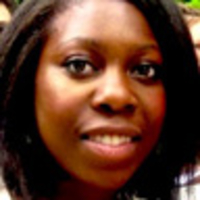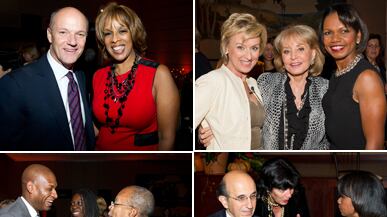From her view of the Tea Party movement (surprisingly sympathetic) to an endorsement of Hillary Clinton’s performance in the job she once held, Condoleezza Rice fired up her book tour Wednesday night with a spirited conversation at a dinner hosted by The Daily Beast and Credit Suisse. Though her just-released Extraordinary, Ordinary People: A Memoir of Family departs from the standard trope of revelatory White House gossip (that will be coming in a second book), Rice tackled many of the hot-button issues in the current election cycle.
Since leaving government in 2009, it’s easy to imagine that Condoleezza Rice has become just another civilian. But the piano playing, figure-skating, sports enthusiast Soviet expert has never been just another anything. Indeed, interviewed on stage by Daily Beast editor in chief Tina Brown what she had learned about herself in writing her memoir, Rice acknowledged the downside of being a child prodigy. “I was a bit of a brat,” she says with a laugh. “My parents had to put up with a lot.”
But while her life and rise to power is an extraordinary American story—her father taught one of the girls killed in the Birmingham church bombing of 1963—even Rice didn’t seem interested in sticking to the “family memoir” script.
On stage, she launched a fairly robust defense of, if not the Tea Party itself, the sentiments behind it: “I certainly don’t agree with everything said by the Tea Party,” she said. “I see people saying the conversation in Washington and the conversation in the rest of the country is not the same conversation… Listen Washington: Out here we’re losing something that’s very essential to being American.”
Gallery: Condoleezza Rice Tells Her Story

She likewise brought up—unprompted—this week’s resignation of Michelle Rhee, the controversial chancellor of the Washington DC public school system. “When we’re living in a country where I can look at your zip code and know whether or not you’re getting a good education, somebody ought to be angry,” she said at the dinner, held in Credit Suisse’s New York tower off Madison Park.
• Stephen L. Carter: Growing Up Condi• Condoleezza Rice: Why I Love the NBA The passionate engagement with education reform is not surprising: Rice, who serves presently as a professor at Stanford University, comes from a family with generations of experience as educators and academics. “My parents and my grandparents believe that if you have a good education you are going to be armored against all the bad things that can happen to you,” she told the crowd, which included Joel Klein, chancellor of the New York City Department of Education and Harvard professor Henry Louis Gates Jr., along with Barbara Walters, Christiane Amanpour, Andrea Mitchell, Pete Peterson, and a host of others on hand for the Daily Beast’s dinner series celebrating women of stature.
Indeed, there are a number of connections between her demanding, Republican home in Birmingham and the most pressing issues in contemporary politics.
With respect to the ongoing conflict in Israel and the occupied Palestinian territories, she told me her experience with segregation colors her impressions of the situation. “I understand the Palestinian mother who has to tell her child they can’t get on the highway because they’re Palestinian. I know what that is. And I can understand the Israeli mother who has to worry if her child is going to be bombed in a terrorist attack. That’s biographical.”
Likewise, her support for the second amendment was forged at the barrel of a gun: She recounted an evening in 1963 on which her father sat on the porch with a rifle to ward off white vigilantes. The other blacks who took up arms were, in her estimation, “a well-regulated militia.” In the language of the Bush Administration’s “war on terror,” she now calls the whites who burned crosses and blew up churches “homegrown terrorists.”
In a sense, Rice seems to believe biography is destiny. (Her longstanding relationships with the fathers of Madeline Albright and Benjamin Netanyahu seem to bear this out.)
Though her discussion of domestic and foreign affairs was that of a daughter and private citizen, Rice subtly defended the elephant in the room: The record of President George W. Bush, and her own legacy as the first black female secretary of state.
Rice emphasized the Bush administration’s focus on immigration reform. “I live in California and I see the stresses and strains it puts on the state,” she said, parting company with the hard-line view more in vogue these days in the Republican Party. “This country was built on immigrants, and if we are not committed to immigration we’re going to go to the sclerotic demographics of Europe and the tragic demographics of Russia.”
Rice also stood up for the neoconservative project of the Bush years and a “long view” of history—one that might change public perception of the wars in Iraq and Afghanistan. “The arc of history is long, not short. It was the people who took good decisions in 1946 and 1947 and 1948 who made it possible for the Cold War to end on Western terms.”
“I certainly don’t agree with everything said by the Tea Party,” she said.
As the Mideast peace talks bog down, Rice is actively monitoring the situation she tried to resolve at a summit in Annapolis in 2008. She believes recent moves from Palestinian Authority leaders to unilaterally declare a state would be “disastrous,” though praised their recent contributions to West Bank security. “It’s an orderly place now,” she says. With respect to a two-state solution, she believes “Israelis are ready for this…Arabs are ready for this…. But it’s going to take some very tough decision on the part of the Palestinian leaders.”
Perhaps her most controversial defensive maneuver was her one-to-one comparison of Bush and President Barack Obama: “On the day the president is inaugurated, he is the smartest, most amazing, most incredible human being, and aren’t we lucky. And a year or two years later we say ‘How could we ever have elected this person president?’ It’s just something in our politics.”
Well, not quite. Obama began his presidency far more popular than Bush was at a similar juncture; according to the Pew Center, Obama’s approval rating was 30 points higher than Bush’s at the time of inauguration. And Obama’s current ratings are actually lower than Bush’s were at the same point in his presidency. Bush’s numbers began to plummet as the Iraq war dragged on, whereas Obama’s woes appear to be a function of the sluggish American economy and the unwinding of the two wars begun by his predecessor.
For Rice to call the situation “just something in our politics” hints at her protective stance toward the president she served—and the memoir yet to come.
Dayo Olopade is a political reporter for The Daily Beast and a Bernard Schwartz Fellow at the New America Foundation.






